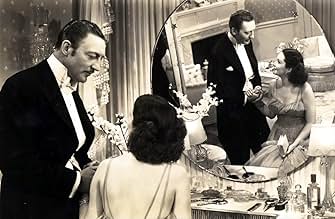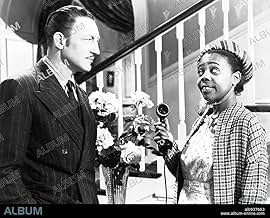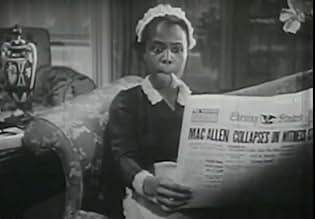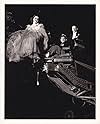A prosecutor trying a case where a husband shot his adulterous wife begins to suspect that his own wife is having an affair, and starts to have his own thoughts about killing her.A prosecutor trying a case where a husband shot his adulterous wife begins to suspect that his own wife is having an affair, and starts to have his own thoughts about killing her.A prosecutor trying a case where a husband shot his adulterous wife begins to suspect that his own wife is having an affair, and starts to have his own thoughts about killing her.
- Director
- Writers
- Stars
Mark Daniels
- Reporter
- (uncredited)
Matty Fain
- Joseph Patterson
- (uncredited)
James Flavin
- Jenks
- (uncredited)
Jack Gardner
- Reporter
- (uncredited)
William Gould
- Prison Warden
- (uncredited)
John Harmon
- Gangster Hitman
- (uncredited)
Grace Hayle
- Lady in Courtroom
- (uncredited)
J. Anthony Hughes
- Murphy
- (uncredited)
- Director
- Writers
- All cast & crew
- Production, box office & more at IMDbPro
Featured reviews
Walter Huston famously said that he wasn't paid to sell good lines, but to put across bad ones. He often did. So did Warren William. For both of them, putting across bad lines frequently involved overacting. It's a bit difficult to believe WW being overcome by passion of any sort, and especially any aroused by his boring (though gracious) clothes-horse of a wife (Gail Patrick) in "Wives Under Suspicion," the tame and uninspired 1939 remake by James Whale of his more visually striking "Kiss Before the Mirror" made only five years earlier, but, presumably, too risqué to be rereleased after the Motion Picture Production Code began to be enforced.
Frank Morgan switched roles from defense attorney in the first to defendant in this one, and, unfortunately, Gloria Stuart and Walter Pidgeon did not return. The story is mechanical and has coincidences that strain credulity, but Warren William gave it his all. The only interesting touch was the courtroom set with the judge raised to an exaggerated height.
Frank Morgan switched roles from defense attorney in the first to defendant in this one, and, unfortunately, Gloria Stuart and Walter Pidgeon did not return. The story is mechanical and has coincidences that strain credulity, but Warren William gave it his all. The only interesting touch was the courtroom set with the judge raised to an exaggerated height.
Wives Under Suspicion from 1938 is a remake of a film called The Kiss Before the Mirror. Directed by James Whale, it's not his best.
This version stars Warren William, Gail Patrick, Ralph Morgan, William Lundigan, and Constance Moore.
William plays a hanging prosecutor, Jim Stowell - he has an abacus with skulls he moves over when he sends someone to the chair. He is not a pleasant guy. His wife Lucy (Patrick) feels alone, as he is dedicated to his work. He does love her and promises her a big vacation.
It doesn't happen because of a big case - a man (Morgan) who found his wife with another man and kills her. He tells the most pathetic story imaginable, and it's recorded. The minute he's taken away, Stowell laughs, dismisses his story as garbage, and plans on getting him the chair.
Lucy is extremely moved by the man's story and feels she doesn't know her husband any longer. Stowell becomes jealous of her platonic friendship with a young man (Lundigan). One night, he sees them talking and rage builds up inside him. He suddenly sees what he has become.
William is a favorite of mine; he always turned in a good performance. Beautiful Gale Patrick is lovely as Lucy - she of course became Gail Patrick Jackson, the producer of the Perry Mason series. Ralph Morgan was a very sympathetic defendant.
The performances helped to hold interest.
This version stars Warren William, Gail Patrick, Ralph Morgan, William Lundigan, and Constance Moore.
William plays a hanging prosecutor, Jim Stowell - he has an abacus with skulls he moves over when he sends someone to the chair. He is not a pleasant guy. His wife Lucy (Patrick) feels alone, as he is dedicated to his work. He does love her and promises her a big vacation.
It doesn't happen because of a big case - a man (Morgan) who found his wife with another man and kills her. He tells the most pathetic story imaginable, and it's recorded. The minute he's taken away, Stowell laughs, dismisses his story as garbage, and plans on getting him the chair.
Lucy is extremely moved by the man's story and feels she doesn't know her husband any longer. Stowell becomes jealous of her platonic friendship with a young man (Lundigan). One night, he sees them talking and rage builds up inside him. He suddenly sees what he has become.
William is a favorite of mine; he always turned in a good performance. Beautiful Gale Patrick is lovely as Lucy - she of course became Gail Patrick Jackson, the producer of the Perry Mason series. Ralph Morgan was a very sympathetic defendant.
The performances helped to hold interest.
Warren William stars in this 1938 drama from Universal about a hard driving law and order District Attorney who gets a chance to reflect on his own attitudes and display the quality of mercy as the Bard put it. It's not an easy thing for him to do by any means.
His chance comes when he prosecutes shy and retiring political science professor Ralph Morgan who in a fit of jealous rage shot his unfaithful wife. William gets a confession out of him and goes full blast to give him the electric chair even with high priced defense attorney Samuel S. Hinds working for Morgan.
What brings him to a reassessment of the case and his attitudes is an Othello like episode in his own life. There's no Iago in the film egging William on, but he develops an almost insane jealousy about his wife Gail Patrick and a young neighbor William Lundigan. And unlike Morgan it's all in his own mind.
Some good attention should be paid for Cecil Cunningham as William's girl Friday assistant in his office who lives up to her character name of 'Sharpy' with some very devastating lines. But stealing the film whenever he's on screen is Ralph Morgan. Such a pitiable creature he is you can't conceive of someone like him going to the chair.
The film takes some interesting attitudes, not popular at this time about the death penalty. Wives Under Suspicion is a fine drama and comes highly recommended.
His chance comes when he prosecutes shy and retiring political science professor Ralph Morgan who in a fit of jealous rage shot his unfaithful wife. William gets a confession out of him and goes full blast to give him the electric chair even with high priced defense attorney Samuel S. Hinds working for Morgan.
What brings him to a reassessment of the case and his attitudes is an Othello like episode in his own life. There's no Iago in the film egging William on, but he develops an almost insane jealousy about his wife Gail Patrick and a young neighbor William Lundigan. And unlike Morgan it's all in his own mind.
Some good attention should be paid for Cecil Cunningham as William's girl Friday assistant in his office who lives up to her character name of 'Sharpy' with some very devastating lines. But stealing the film whenever he's on screen is Ralph Morgan. Such a pitiable creature he is you can't conceive of someone like him going to the chair.
The film takes some interesting attitudes, not popular at this time about the death penalty. Wives Under Suspicion is a fine drama and comes highly recommended.
While this film doesn't seem to have impressed Michael much, I found it somewhat better than SINNERS IN PARADISE (1938) though, obviously, not quite in the same league as Whale's irreproachable horror output.
The film's plot, though essentially contrived, makes for a very interesting melodrama: actually, this was a remake of the same director's THE KISS BEFORE THE MIRROR (1933) and the only review I could find called it "tame and uninspired" when compared to the "more visually striking" Pre-Code original (that was apparently shot on leftover sets from Whale's own FRANKENSTEIN [1931]!) - all of which makes me want to watch the 1933 film even more...
Despite its 'B' picture status, however, the film is stylishly handled by a master craftsman (right from the opening credit sequence) with special care given to camera-work, lighting and décor - not to mention the recurring use of montages; in fact, the latter sequences - along with the hectic pace and the theme itself - recalled some of the social conscience films being made contemporaneously by Warner Bros.! Warren William and Ralph Morgan give solid performances and their scenes together - particularly the latter's confession and the subsequent trial - are certainly among the film's highlights. Unfortunately, however, as was the case with the blackface scene from Whale's own REMEMBER LAST NIGHT? (1935), the film's stereotyped depiction of William's black maid would, most probably, not go down well with today's audiences!
While I never really understood why certain directors needed to remake their own films, I'm certainly glad it happened in this case - particularly since the original doesn't seem to be readily available (a regrettable situation with regards to most of Whale's non-horror titles!), but also because his second stab at the story has certainly made for a pretty good film in its own right.
The film's plot, though essentially contrived, makes for a very interesting melodrama: actually, this was a remake of the same director's THE KISS BEFORE THE MIRROR (1933) and the only review I could find called it "tame and uninspired" when compared to the "more visually striking" Pre-Code original (that was apparently shot on leftover sets from Whale's own FRANKENSTEIN [1931]!) - all of which makes me want to watch the 1933 film even more...
Despite its 'B' picture status, however, the film is stylishly handled by a master craftsman (right from the opening credit sequence) with special care given to camera-work, lighting and décor - not to mention the recurring use of montages; in fact, the latter sequences - along with the hectic pace and the theme itself - recalled some of the social conscience films being made contemporaneously by Warner Bros.! Warren William and Ralph Morgan give solid performances and their scenes together - particularly the latter's confession and the subsequent trial - are certainly among the film's highlights. Unfortunately, however, as was the case with the blackface scene from Whale's own REMEMBER LAST NIGHT? (1935), the film's stereotyped depiction of William's black maid would, most probably, not go down well with today's audiences!
While I never really understood why certain directors needed to remake their own films, I'm certainly glad it happened in this case - particularly since the original doesn't seem to be readily available (a regrettable situation with regards to most of Whale's non-horror titles!), but also because his second stab at the story has certainly made for a pretty good film in its own right.
District Attorney Warren William works so hard he neglects wife Gail Patrick. He's ferociously prosecuting a case against Ralph Morgan, accused of killing his wife. Morgan's lawyer tells him it was temporary insanity and wants to bargain it down to manslaughter. Warren laughs at the deal. Then he comes to believe his wife is about to leave him for a lover.
Based on a play by Ladislas Fodor, director James Whale had already made this story as a pre-code, THE KISS BEFORE THE MIRROR. William plays this like he's playing Caesar for Demille. It's an uneasy set of volumes, playing it immense while cross-examining a defense witness, then minutely observing a small detail, then laughing amiably with his office staff. I think he and the director were trying for a manic-depressive character, but William was always deliberate and mannered in his performances. As a result, it's one of those movies that is fascinating to watch, even if it doesn't work. With Cecil Cunningham, Cnstance Moore, William Lundigan, Samuel S. Hinds, and Jonathan Hale.
Based on a play by Ladislas Fodor, director James Whale had already made this story as a pre-code, THE KISS BEFORE THE MIRROR. William plays this like he's playing Caesar for Demille. It's an uneasy set of volumes, playing it immense while cross-examining a defense witness, then minutely observing a small detail, then laughing amiably with his office staff. I think he and the director were trying for a manic-depressive character, but William was always deliberate and mannered in his performances. As a result, it's one of those movies that is fascinating to watch, even if it doesn't work. With Cecil Cunningham, Cnstance Moore, William Lundigan, Samuel S. Hinds, and Jonathan Hale.
Did you know
- TriviaRalph Morgan's (Shaw MacAllen) brother Frank Morgan starred in the original version, The Kiss Before the Mirror (1933), in a different role.
- GoofsWhen Lucy Stowell walks over to the telephone to take a call, she throws the newspaper down on the floor in disgust, and it lands about a foot away from the edge of the rug. She leaves the newspaper there and goes upstairs. When her husband enters the house the next minute, the newspaper is now positioned at the edge of the rug.
- ConnectionsEdited into Haunted Hollywood: Wives Under Suspicion (2016)
Details
Box office
- Budget
- $250,000 (estimated)
- Runtime
- 1h 9m(69 min)
- Color
- Aspect ratio
- 1.37 : 1
Contribute to this page
Suggest an edit or add missing content





































